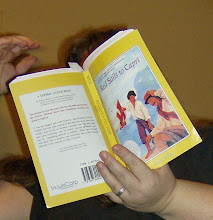So, recently I had an ARD meeting at the public school concerning my ds10 who has learning disabilities(ld). They told me I was incorrect in wanting him to completely master a topic before moving on. Specifically I do this in math. My point being if the child cannot ADD, why oh why do we even try to teach him something else? Esp when it builds on his ability to ADD!?
Their point was that my idea of mastery and my ds's ability to master may be two different things, and I could stay on addition forever waiting for him to master it.And besides, the 4th graders at school are already doing mult. and division in the same problem. I asked them as long as he learned it, did it matter when he learned it?
Well, I saw their point and even though he and my other 2 students could not pass 100 1 digit problems in under 3 minutes like my curriculum calls for them to do, I moved on to subtraction. I thought Hey, subtraction is the opposite of addition, so technically, I am still working on addition, right?
Well, it turns out to be wrong. Now I have two students making tally marks on their papers to count up the subtraction problems and the other one is also struggling to do the inverse of addition! My math-brained husband asked me if I skipped pages in the math book in order to get them to subtraction. I said yes and he replied It shows.
This math book was hand picked by my math brain husband. Yeah, it flies in the face of today's educational theories, esp. spiraling. This is a mastery approach. At least w/ addition, and I dare say, arithmetic, how can I move on to another concept that builds on this one if they don't know it?! This program has been slow going, even for my older son, but he sure knows math! And thinks mathmatically.
My dh purports that they will have an easier time w/ subtraction if I will just spend some more time on addition and memorizing the addition facts.So I did that today. And surprise surprise, I wasn't met w/ blank stares and "I don't get it"s!!
Actually I am glad I tried to move on. And I imagine I will do what the school suggested and that is to introduce new topics and continue to go back and review old topics. I think I am going to keep having them drill addition facts and have them add 3 and 4 single digit numbers to help them to memorize the facts AND try to move them along in the book.
But not too far! Why should I be in a huge hurry to get them to memorize multiplication facts(which is the next section after subtraction) if they don't have the addition and subtraction facts memorized backward and forward? My dh pointed out that you may not use algebra and the higher maths everyday, but EVERYone uses addition and subtraction ALL the time.
A Slow Cooker Thanksgiving
1 month ago





2 comments:
Actually multiplication and division facts may actually HELP in addition facts. Because multiplication is simply the number of objects in a row times the number of rows- it can be done as addition (7+7+7=21).
Mastery level is 100 problems in five minutes- but my son (who graduated from West Point in Physics last year) could never go that fast:>)
Spiraling is the key. Sometimes when you dwell on things TOO long you develop a mental block. You need to walk away and come back to it. Putting a value to the subject is another key (like having them keep a money register of savings or tithing puts addition and subtraction into the real world).
Can you tell I have been teaching a LONG time?
Welcome to the blogging world!
Thank you so much for commenting Janette! I appreciate the input of others who know more than I do and/or have been there before. Esp. homeschoolers. To me the school can't quit understand. At least I don't think so!
Post a Comment